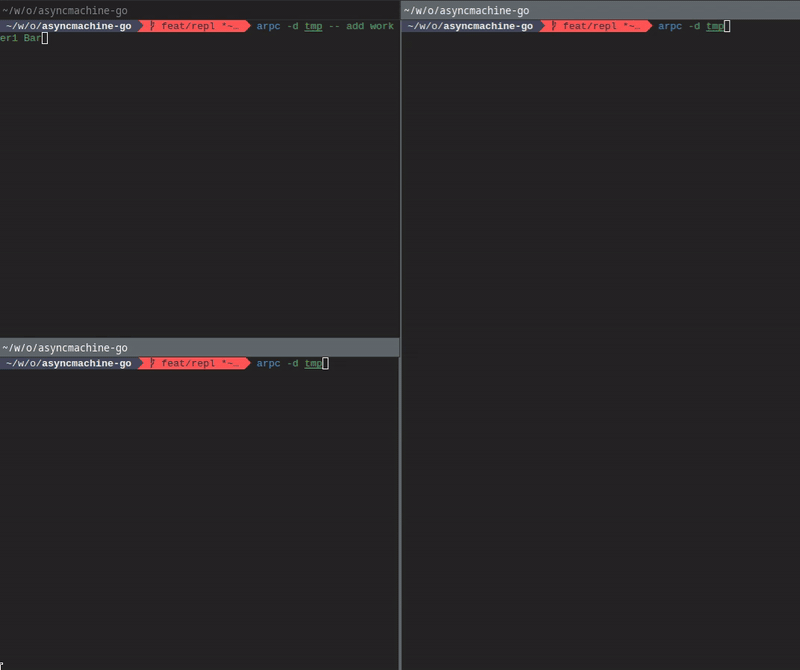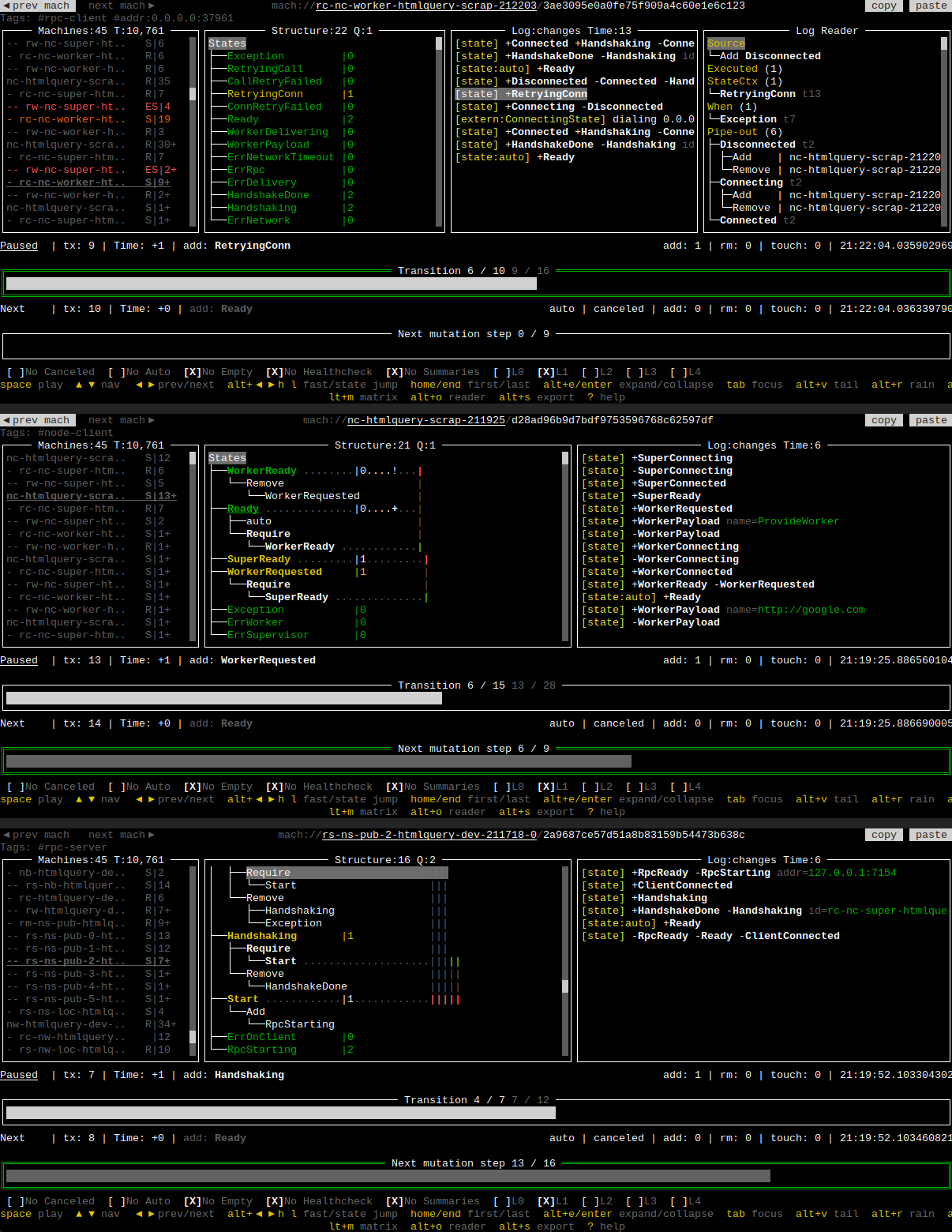Note
State machines communicate through states (mutations, checking, and waiting).
asyncmachine-go is a declarative control flow library implementing AOP and Actor Model through a clock-based state machine. It offers atomic consensus, transparent RPC, TUI debugger, telemetry, REPL, remote workers, and soon diagrams.
Its main purpose is workflows (in-process / distributed / decentralized), although it can be used for a wide range of
stateful applications - daemons, UIs, configs, bots, firewalls, consensus algos, smart graphs, etc.
asyncmachine can precisely (and transparently) target a specific point in a scenario and easily bring structure to
event-based systems. It takes care of most contexts, select statements, panics, and allows for structured concurrency.
It aims at creating autonomous workflows with organic control flow and stateful APIs:
- autonomous - automatic states, relations, context-based decisions
- organic - relations, negotiation, cancellation
- stateful - maintaing context, responsive, atomic
Top layers depend on the bottom ones.
| . | . | . | . | . | . | PubSub | . | . | . | . | . | . |
| . | . | . | . | . | Workers | . | . | . | . | . | ||
| . | . | . | . | RPC | . | . | . | . | ||||
| . | . | . | Handlers | . | . | . | ||||||
| . | . | 🦾 Machine API | . | . | ||||||||
| . | Relations | . | ||||||||||
| States | ||||||||||||
Minimal - an untyped definition of 2 states and 1 relation, then 1 mutation and a check.
import am "github.com/pancsta/asyncmachine-go/pkg/machine"
// ...
mach := am.New(nil, am.Struct{
"Foo": {Require: am.S{"Bar"}},
"Bar": {},
}, nil)
mach.Add1("Foo", nil)
mach.Is1("Foo") // falseComplicated - wait on a multi state (event) and the Ready state with a 1s timeout, then mutate with typed args, on top of a state context.
// state ctx is an expiration ctx
ctx := client.Mach.NewStateCtx(ssC.WorkerReady)
// clock-based subscription
whenPayload := client.Mach.WhenTicks(ssC.WorkerPayload, 1, ctx)
// state mutation
client.WorkerRpc.Worker.Add1(ssW.WorkRequested, Pass(&A{
Input: 2}))
// WaitFor* wraps select statements
err := amhelp.WaitForAll(ctx, time.Second,
// post-mutation subscription
mach2.When1(ss.BasicStatesDef.Ready, nil),
// pre-mutation subscription
whenPayload)
// check cancellation
if ctx.Err() != nil {
return // state ctx expired
}
// check error
if err != nil {
// err state mutation
client.Mach.AddErr(err, nil)
return // no err required
}
// client/WorkerPayload and mach2/Ready activatedHandlers - Aspect Oriented transition handlers.
// can Foo activate?
func (h *Handlers) FooEnter(e *am.Event) bool {
return true
}
// with Foo active, can Bar activate?
func (h *Handlers) FooBar(e *am.Event) bool {
return true
}
// Foo activates
func (h *Handlers) FooState(e *am.Event) {
h.foo = NewConn()
}
// Foo de-activates
func (h *Handlers) FooEnd(e *am.Event) {
h.foo.Close()
}Schema - states of a node worker.
type WorkerStatesDef struct {
ErrWork string
ErrWorkTimeout string
ErrClient string
ErrSupervisor string
LocalRpcReady string
PublicRpcReady string
RpcReady string
SuperConnected string
ServeClient string
ClientConnected string
ClientSendPayload string
SuperSendPayload string
Idle string
WorkRequested string
Working string
WorkReady string
// inherit from rpc worker
*ssrpc.WorkerStatesDef
}All examples and benchmarks can be found in /examples.
🦾 /pkg/machine is the main package, while /pkg/node shows a high-level
usage. Examples in /examples are good for a general grasp, while /docs/manual.md
and /docs/diagrams.md go deeper into implementation details.
/tools/cmd/am-gen can kick it off, while /examples/mach_template
is the ultimate copy-pasta, and /tools/cmd/am-dbg records every detail. Reading tests is
always a good idea...
This monorepo offers the following importable packages and runnable tools:
/pkg/helpersUseful functions when working with async state machines./pkg/historyHistory tracking and traversal.- 🦾
/pkg/machineState machine, dependency free, semver compatible. /pkg/nodeDistributed worker pools with supervisors./pkg/rpcRemote state machines, with the same API as local ones./pkg/statesReusable state definitions, handlers, and piping./pkg/telemetryTelemetry exporters for dbg, metrics, traces, and logs./pkg/pubsubDecentralized PubSub based on libp2p gossipsub./tools/cmd/am-dbgMulti-client TUI debugger./tools/cmd/am-genGenerates states files and Grafana dashboards./tools/cmd/am-visGenerates diagrams of interconnected state machines./tools/cmd/arpcNetwork-native REPL and CLI.
- am-dbg TUI Debugger Single state machine TUI app.
- arpc REPL Cobra-based REPL.
- libp2p PubSub Simulator Sandbox simulator for libp2p-pubsub.
- libp2p PubSub Benchmark Benchmark of libp2p-pubsub ported to asyncmachine-go.
Under development, status depends on each package. The bottom layers seem prod grade, the top ones are alpha or testing.
- before
./scripts/dep-taskfile.shtask install-deps
- after
task testtask formattask lint
- good first issue
It calls struct methods according to conventions, a schema, and currently active states (eg BarEnter, FooFoo,
FooBar, BarState). It tackles nondeterminism by embracing it - like an UDP event stream with structure.
State is a binary name as in status / switch / flag, eg "process RUNNING" or "car BROKEN".
Each state has a counter of activations & de-activations, and all state counters create "machine time".
Same event happening many times will cause only 1 state activation, until the state becomes inactive.










